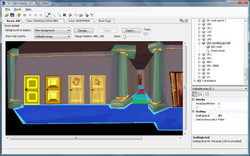Adventure Game Studio
The topic of this article may not meet Wikipedia's notability guidelines for products and services. (August 2009) |
 The room editor in AGS v3.1.2 SP1 | |
| Developer(s) | Chris Jones |
|---|---|
| Initial release | 1997 (version 1) |
| Stable release | |
| Preview release | |
| Repository | |
| Operating system | Windows Linux (runtime only) Mac OS X (runtime only) |
| Platform | Personal computer |
| Available in | English |
| Type | Game engine |
| License | Freeware |
| Website | Adventure Game Studio homepage |
Adventure Game Studio (acronym AGS) is a freeware tool that can be used to create graphical adventure games. It is aimed at intermediate-level game designers, and combines an Integrated development environment (IDE) for setting up most aspects of the game with a scripting language to process the game logic.
History
Adventure Game Studio was created by British programmer Chris Jones. AGS was originally released in 1997 as an MS-DOS program entitled "Adventure Creator".
Jones was inspired by the apparent simplicity of Sierra On-Line's adventure game interface, specifically as showcased in Space Quest IV: Roger Wilco and the Time Rippers.[1] The first version of Adventure Creator allowed users to create only low-res, keyboard controlled games.
Initially only small tests and demo games were created with AGS, and most of the "more ambitious" projects were cancelled. As a result of the lack of completed games and engine features the user base was small, but the community grew slowly. Game developers started requesting more features so that they could create more complex games. Gradually as these requests were implemented, AGS became a more capable toolkit and it was finally possible to create high quality games with it.
After a long period of slow activity, Lassi Quest was released as the first complete AGS game in late 1999. It was not until the Larry Vales and Rob Blanc games had been released in 2000-2001, that the engine gained widespread popularity[2]. There is now an active community containing thousands of members, and a large output of completed games of all sizes.
AGS itself continues to be added to and improved upon, with the Version 3.0 release in January 2008 including a complete rewrite of the editor using the .NET Framework, and an update to the game engine to support 3D hardware acceleration.
Capabilities
The editor and runtime engine are currently designed for Windows operating systems, though Mac OS and Linux ports of the engine are also available, the Mac OS port is currently discontinued. Prior to AGS 2.7, a DOS engine was also available; this has since been discontinued. It is not yet possible to run the editor to create games on operating systems other than Windows without an emulator or API wrapper like WINE.
AGS can create games with a graphical range from 256 colours and a resolution of 320x200 (games with more "classic" looks) to true colour games with a resolution of up to 1024x768 (games with more "modern" looks) and an alpha channel. The higher the resolution, the more demanding a game is on computer resources, resulting in the need for a faster computer.
Games
This article may contain excessive or irrelevant examples. |
Thousands of games have been produced in the years since AGS was first released. These vary extensively in quality, from short 'test games' to full-length professional-quality games. It has even been used to create arcade and board games.
The AGS Games Page has a complete list.
- 5 Days a Stranger: 5 Days a Stranger has become one of the landmark games of AGS, and has spawned three sequels: 7 Days a Skeptic, Trilby's Notes and 6 Days a Sacrifice, as well as a stealth-based platform game Trilby: The Art of Theft.
- Ben Jordan: Paranormal Investigator A series of 7 games (as of August 2008) featuring a character who investigates paranormal activities around the world.
- Reality on the Norm A series of games set in a town called Reality on the Norm, started in 2001. The idea behind the series was that anyone could create an episode, and add new characters, places or storylines, similar to a wiki. As of 2009, the series has 82 episodes.
- Soviet Unterzoegersdorf/Sector 1: A game by Austrian art/philosophy group monochrom. The fake history of the "last existing appanage republic of the USSR", Soviet Unterzoegersdorf. Created to discuss topics such as the theoretical problems of historiography, the concept of the "socialist utopia" and the political struggles of postwar Europe. To monochrom it was clear that the adventure game, an almost extinct form of computer game, would provide the perfect media platform to communicate the idea of "Soviet Unterzoegersdorf"[1]. Edge (games magazine) chose the game as their Internet Game of the Month for November 2005.[2]
One of the more popular ways to create a full-length game is to take an old adventure and to update it, either by simply creating a point-and-click interface or by completely overhauling the graphics. AGD Interactive and Infamous Adventures (remaking and updating the King's Quest series and other Sierra releases) and LucasFan Games (similarly with LucasArts adventure games) are three of the leading creators of these updated classics.
- Al Emmo and the Lost Dutchman's Mine: The first commercial release from the people behind AGD Interactive.
Community
The AGS community is based on the AGS Forum and the AGS Internet Relay Chat channel. There have now been IRL meetings of the community each summer for some years, known as Mittens. There is also an ongoing blog covering the latest goings on in AGS development, games and community. The community runs several competitions to create games, art, writing and music, and the annual AGS awards to honour the best of the year.
See also
References
